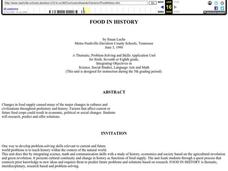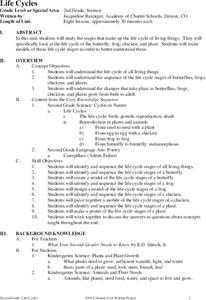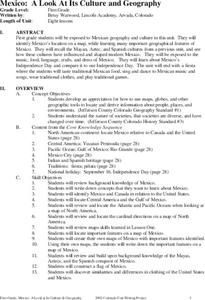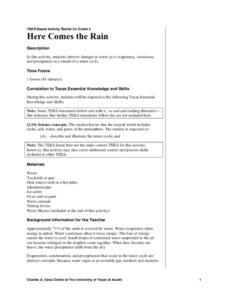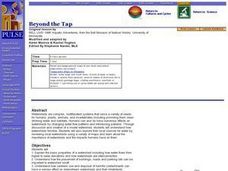Curated OER
Project Wetlands
Students develop a joint undertaking designed to solve an environmental problem in their local community. They tackle the problem of erosion of banks and chemical run-off into a nearby lake, which is within walking distance of school.
Curated OER
Supermarket Science: The King Sooper Lab
Students read product labels, compare fat, sodium, and sugar contents of various food items. They work with a partner and often employ the assistance of the deli and bakery managers in a supermarket.
Curated OER
In the Eyes of the Beholder
High schoolers investigate the relationship between the consumers and producers with the role that the government plays in the free enterprise system.
Curated OER
Effective Speaking In A Debate
High schoolers confront stage fright and recognize their speaker strenghs and weaknesses. They develop ways to control and direct their fear of speaking.
Curated OER
Food in History
Learners research, predict and offer solutions regarding factors that affect current or future food crops could result in economic, political or social changes.
Curated OER
Surveying Society's Attitudes About Crime
Students investigate how crime reporters do their jobs and how the news of crime gets reported.
Curated OER
Notes on Cell Organelles
Middle schoolers record information and write journal entries on the structure and function of cell organelles while viewing a Powerpoint presentation.
Curated OER
Life Cycles
Students explore the life cycle of living things through the eight lessons of this unit. The butterfly, frog, chicken, and plant are inspected and form the basis of the work done in this unit.
Curated OER
Mexico: A Look At Its Culture and Geography
Students canvass the Mexican geography, culture, dress, language, crafts, and traditions in this unit of eight lessons. The Mexican Independance Day is compared to our own and the contributions of the Mayan, Azetec, and Spanish are...
Curated OER
Lewis and Clark in Washington Shrub Steppe Habitat
Students reserach the flora and fauna next to their school for two days and also Lewis and Clark's journals. They compare Lewis and Clark's description of the area to the one they have today. They also discuss the idea of restoring...
Curated OER
Cartographer and Journalish as Storytellers
Students collaborate in groups of four students to create a written description of their community during a specific year. They analyze data provided by maps and newspaper articles. They meet as a whole class to discuss their conclusions.
Curated OER
My Neighborhood
Second graders discuss maps and identify boundaries found on a map. They walk through their school and nearby neighborhood and collect information regarding important features of the area.
Curated OER
Here Comes the Rain
Second graders help to prepare a model of the water cycle before the conduction of this experiment. They use the model in order to observe changes that happen to water when it changes states of matter.
Curated OER
Up, Up, and Away
Second graders observe the changes that water has when there is a change in a state of matter. In this lesson plan they observe the results of applying heat to water with the end result of conversion to a gas.
Curated OER
Air Masses
Students examine the physical characteristics of several types of air masses to discover how air masses can be identified and defined by their temperature and moisture content.
Curated OER
A Snapshot in Time
Students state the main ideas of the article. They create questions to clarify the meaning of the article and to help explain the ideas. Students cite words or phrases that reveal a bias the author may have.
Curated OER
The Portion is the Poison
Students calculate the amount of everyday food products or liquids that would need to be consumed in order to become toxic. By using unit analysis, they calculate the amount of certain common food items that would need to be consumed in...
Curated OER
Detection Detective
Students describe what each detection method uses and rank the wavelengths of each if appropriate. They answer questions about absorption, importance of materials and explain differences. Students make sure they describe diagnostic uses...
Curated OER
The Right Tool for the Job: Diagnosis Spectrum
Students watch a section of a medical TV show and individually make a written recommendation of appropriate imaging techniques to be used and explain why they chose these techniques. They participate in a discussion revealing their...
Curated OER
Thinking inside the Box: Dangers of Tanning Beds
Students research their assigned position pro- or con- for the statement "The use of tanning beds by teens should be regulated" and write a short position paper. They participate in a debate concerning the statement. Students write a one...
Curated OER
Beyond the Tap
Students explain the basic properties of a watershed including how water flows from higher to lower elevations and how watersheds are interconnected. They comprehend how the placement of buildings, roads, and parking lots can be...
Curated OER
Groundwater Modeling
High schoolers evaluate the effects of point and non-pointy sources of water pollution using a model. They assess human impact on water quality. Students build a model which represents an aspect of the hydrosphere and compare their model...
Curated OER
Language Arts: Investigating Issues That Matter
High schoolers are able to become more informed about the dangers of water contamination by sharing their prior knowledge with each other. They discover the importance of communicating these dangers to the public.
Curated OER
Language Arts: How Can Research Shape Ideas?
Students are able to characterize arsenic and determine its potential health threats in writing. They are able to compare and contrast arsenic to other water pollutants using Venn diagrams. Students are able to demonstrate essay skills...






